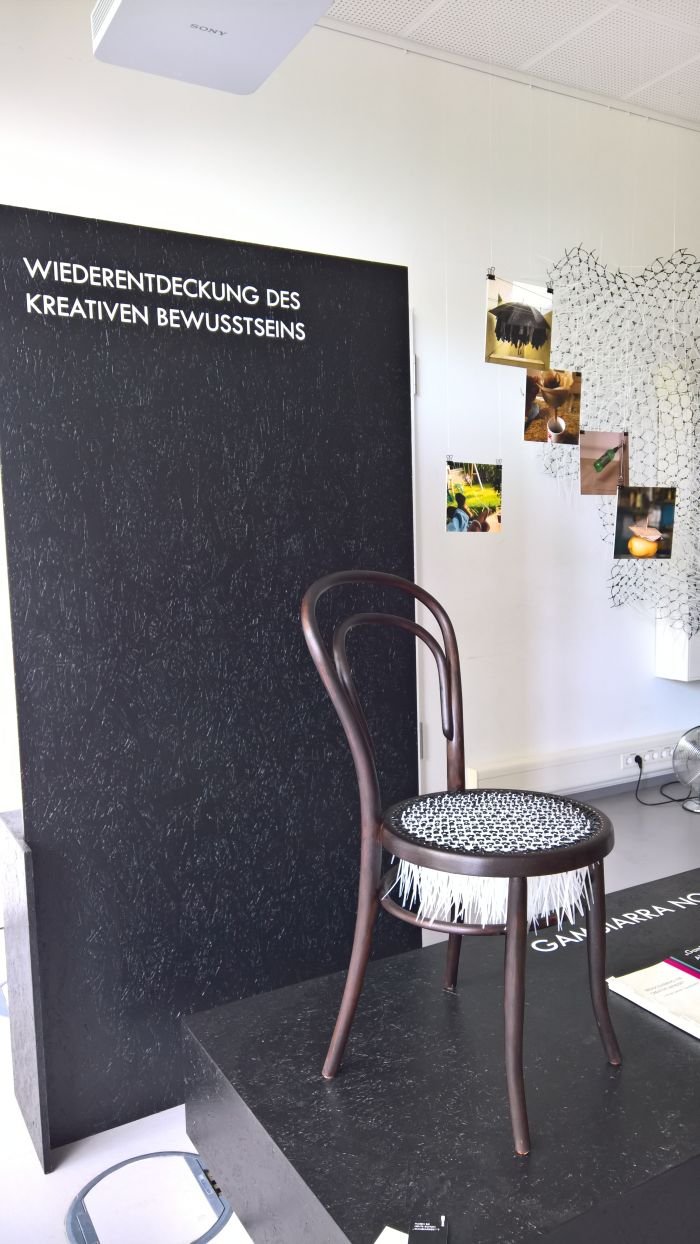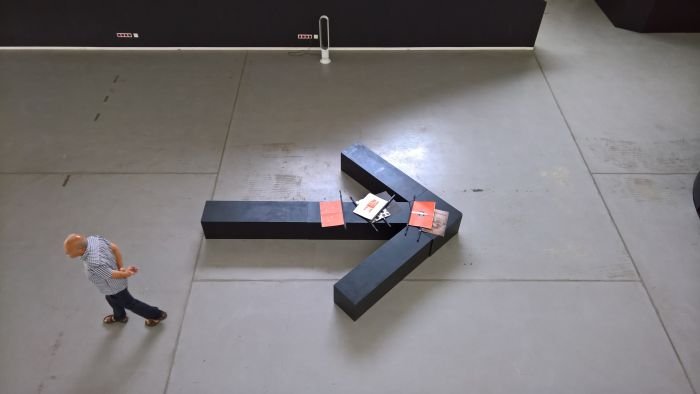As we regularly note in our #campustour posts, what students produce is largely irrelevant, alone important in how the student got there, including how they responded to a given brief, posed their initial question, the logic in the decisions they made, the lessons learned from their mistakes, the lessons learned from others, the impulses received from contemporary discourses, etc, and how through the course of all such their understanding of and relationship to design evolved......
The Münster School of Design understand this process as a Parcours.
Their graduation exhibition allowing chance to reflect on all that leaping, bounding, climbing, rolling......
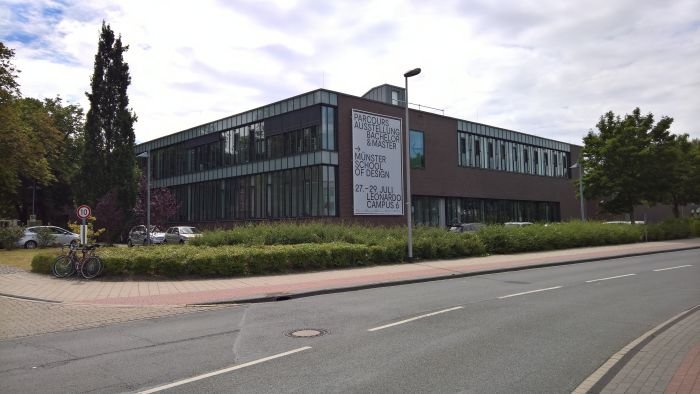
As with so many tertiary education institutes in the German State of Nordrhein-Westfalen, NRW, the Münster School of Design was established in context of a 1971 education reform, a reform which saw numerous existing public and private institutions merge to form a single Fachhochschule, FH, [technical college]; specifically in the case of the FH Münster this involved the merging of seven local mechanical engineering, building trades and civil engineering colleges and the Werkkunstschule Münster, an institution which is thereby, effectively, the forerunner of the contemporary FH Münster design faculty a.k.a. Münster School of Design.
The origins of the Werkkunstschule Münster lie in a Zeichen, Mal und Modellier Schule [Drawing, painting and modelling school] established in the city in 1878, and today the majority of the courses at Münster School of Design remain (conventionally) 2D, specifically, the Bachelors in Communication Design, Illustration & Media Design, traditional 3D creativity is maintained in the Product Design Bachelor while the Master in Information & Communication offers elements of both.
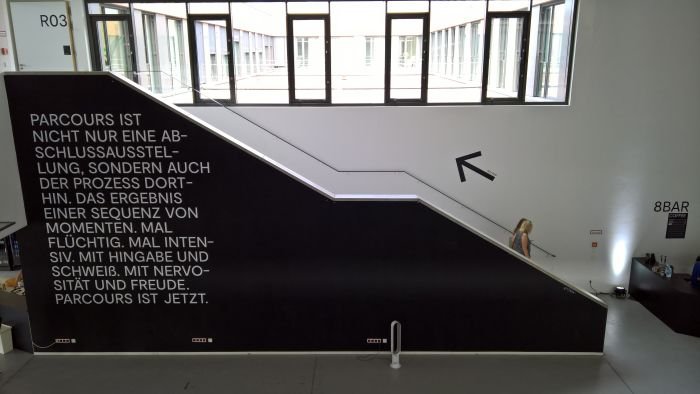
Presenting summer graduation projects from across the school's programmes, the 2018 Münster School of Design Parcours exhibition featured a wide and varied collection of works including Resolute Moritz Tigges's re-imagining of the the nursing wheelchair, an object which in contrast to the mobility or sport wheelchair has arguably long been overlooked by designers, yet one where designers equally arguably have a lot to offer; with Momentum Leandra Fliß developed a laptop case with a logical, and unignorable, internal organisation system aimed at increasing efficiency; while with Offlight Leonie Schmidt and Nina Stratmann propose a lamp which uses digital technology to encourage analogue communication: the lamp only illuminates when you lay your smartphone on top and thereby out of use.
As presented at Parcours 2018 Offlight featured four spot lamps each linked to a pad on the top, when a smartphone is placed on a pad the associated spot illuminates, when four of you place your smartphones on top you have a fully illuminated lamp. And therefore a fully illuminated table. While fully appreciating the symbolism of the act, the metaphor in the functionality, it did/does, on the one hand, strike us as the sort of object that lives from the novelty factor, if ,for example, one hangs in your regular bar/café, the first time you use it its a wonderful shared experience, the next time less so, then lleessss ssoo, llleeessssss sssooo etc, and after a few weeks you'll all have got use to sitting in the dark. Then there is those who don't have a smartphone, don't want a smartphone. As ever more daily functionalities become dependent on a smartphone the risk of social exclusion, and of a society divided not only along social, educational, wealth lines but also phone ownership, becomes more acute. A truly ridiculous consideration. But possible.
Which all isn't to completely negate nor denigrate the idea, far from it. If we assume that the length of time some people spend on their phones is a public health problem, then designers have a role to play in helping find solutions, arguably the first being to stop developing projects that require a smartphone/digital technology, to stop increasing our daily dependence on mobile devices. Would appear logical. Certainly welcome. Not least in context of the ecological impact of our contemporary digital culture and online behaviour, and as discussed in context of the exhibition Buy Now, Pay Later at MAD Brussels. But beyond that, to develop projects which help alter behavioural patterns, projects such as Offlight. We just understand the light as too little impetus, too little learn effect, too easy to negate by hardcore addicts, and also as we say excludes those without a smartphone. But elsewhere in context of projects aimed at, for example, keeping pupils off their phones in schools, employees off their phones in the office, etc, certainly very interesting and worthy of more consideration.
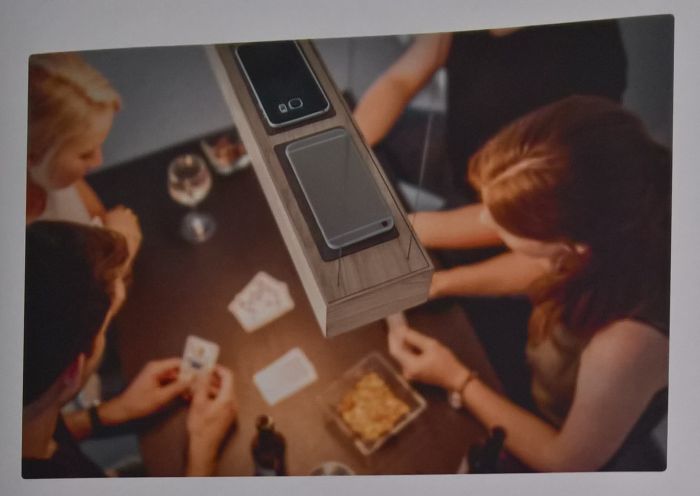
Equally worthy of more consideration is Gambiarra, a Portuguese term which can be loosely translated as makeshift repairs/solutions, the art of taking that which is to hand and crafting a solution for your current problem; or put another way, the old truth that design is a way of thinking not a profession.
Design/Gambiarra is the wine bottle rolling pin, the old bedstead as a climbing frame for roses, or that chair that Burg Halle use as a door stop. We've got a new word for it now, and we are so happy!
Superficially Luiza Leorato de Araujo's Product Design Bachelor project presented Gambiarra No.14, a Thonet Chair 14 with the traditional wicker work seat replaced by a weave of plastic cable binders. However, the wider project was much more about encouraging a differentiated perspective on design, about helping explain that, as noted above, all are capable of design thinking one just has to free the imagination from thoughts on the industrially produced and commercially available, and by extrapolation encouraging a more differentiated view on the role of the designer, and a project which for us neatly underscored that the role of the designer isn't necessarily to develop new solutions but to find answers, answers that invariably already exist but just need an honest and untethered view, and may involve learning from other cultures, epochs, disciplines, etc, etc, etc. Or as Trinity tells Neo in The Matrix, "The answer is out there, Neo, and it's looking for you, and it will find you if you want it to."
And, yes, using plastic cable binders to repair a chair arguably isn't the most environmentally responsible solution, did/does however very neatly and satisfyingly explain the wider considerations.
Full details on the Münster School of Design can be found at www.fh-muenster.de/msd
And all 2018 Münster School of Design graduation projects can be found at www.parcours-muenster.de
